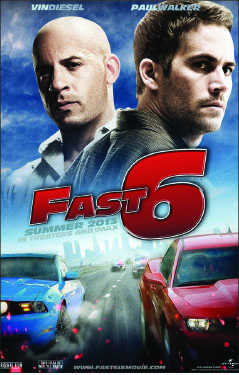For decades, many have looked to Hollywood as a sort of citadel, where master storytellers produce great works of amazing fiction, capturing the hearts and minds of the audience.
I often find myself entrapped in a suspenseful story, imagining myself within the harrowing situations of the hero.
However, a noticeable trend has been occurring, and it involves movies like “Fast & Furious,” “Pirates of the Caribbean,” “Saw” and many others.

STOP SEQUELS — Series like “The Fast and the
Furious” limit the industry to tiresome repitition. Photo credit: Google Images
Recently, several news sources reported three more installments will be made for “The Fast and The Furious” series. That means that we will be seeing installments seven, eight and nine of “The Fast and the Furious” series.
A fifth “Pirates of the Caribbean” will also be gracing the screens of theaters everywhere, even when a large majority of moviegoers, including myself, thought the third film would have ended the swashbuckling movie series just fine.
Even though the movie industry continues to make sequels, I believe the greater potential for movies that challenge us to think deeper and examine our own lives is found in new, groundbreaking movies. Though sequels might prove to open the wallets, original movies have the capability to open minds.
Stephan Schultze, cinematographer and executive director at Liberty’s Zaki Gordon Cinematic Arts Department, talked of how it comes down to the people who watch the movies.
“What’s changed is who goes to the movie and how many people go to the movie,” Schultze said. “The industry generates 60-70 percent of revenue in the foreign market. When I or someone else make a movie, we only make 30-40 percent of our money in the domestic market.”
Schultze went on to talk about the risk of making a single movie tailored for American culture, which would cut off possible viewership overseas, therefore virtually chopping potential revenue in half.
“Because the studios are in the business of making global films, they have to take global ideas, things that translate and play as well in the United States as they would in Europe, in a tent in Afghanistan, in India or in Russia,” Schultze said. “You name it — it’s got to be accessible to a global market.”
Movies like “The Fast and The Furious,” reach a very wide audience, all the way from Brazil to Australia with a few stops along the way. According to Internet Movie Database, the sixth movie made more than $238 million in the U.S. and nearly $789 million worldwide Sept. 5, 2013.
Or take “Pirates of the Caribbean,” which made more than $241 million in the U.S. Sept. 25, 2011 but more than $1 billion worldwide Nov. 25, 2011.
When I look at the numbers and listen to the experts, I realize Hollywood is part citadel for master storytellers and part bank. Looking at the numbers, sequels simply satisfy audience craving for entertainment.
If there is a demand for sequels, then the demand will be answered.
“Nobody really is in anything strictly for the art except the artist,” Schultze said. “Anybody who is taking that art and making money on that art has to look on the return on investment, and they have to do the math.”
According to Schultze, smaller, singular movies do not have the distribution power that large studio productions have.
“Those don’t have the broader reach because they don’t get the distribution that studio films create, but that really is where the market is today,” Schultze said. “I think there will be a returning of the studios to smaller films probably in the next 5-10 years, because it’s a natural cycle.”
As movie industry professionals like Schultze examine the market in order to better understand the opportunities it holds, I look to it with eager expectation. It is my hope that as we journey through life, we will be inspired and uplifted with novel, encouraging stories of valor that challenge us to be better than we can be.